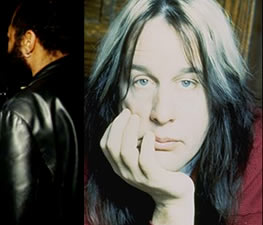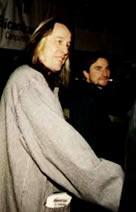 |
|||||
 |
|||||
A Conversation with Todd Rundgren (continued)
PM: I once interviewed Becker & Fagen [Steely Dan], and they talked about how their approach to chord voicings and harmony was influenced by Laura Nyro. I know you've said you were influenced by her too. What kinds of things about her writing affected you most?
TR: I think there is that more sophisticated R & B thing or the Burt Bacharach side of pop music that involves not just chords that are richer, major and minor sevenths and suspensions and things like that, but the sort of melodic movement and the classical counterpoint elements--that's one of the things that attracted me. But I know for a fact that her influences were the more sophisticated side of R & B, like Jerry Ragovoy and Mann & Weil and Carole King. That is Laura Nyro's lineage. She was a source for that, in a sense, and she also had her own very original and very jazz-influenced way of seeing things. It was that extra layer that made her influential. A lot of those chords she got from other people.
But beyond the elements of her composition, I always thought it was the way she played her own material that really sold it. Nobody ever did a cover version of a Laura Nyro song that was as good as her original version. As time went on, she got into this more introspective, less blatantly emotional approach to music and I sort of lost interest in her after that. It wasn't as if she didn't still have all those elements of her songwriting in there. I just don't think she was selling it in the same way.
PM: Did you know her?
TR: I knew her fairly well. I met her right after Eli & The Thirteenth Confession. I actually had arranged a meeting, just because I was so infatuated with her and I wanted to meet the person who had produced all this music. We got along, and we were kind of friendly, and actually, after I met her the first time, she asked me if I wanted to be her band leader. But The Nazz had just signed a record contract and I couldn't skip out on the band, even though it was incredibly tempting.
Years later, she was having trouble getting into the groove on an album called Mother Spiritual. She had worked with a lot of the old people like Roy Hallee who had helped her get Eli & The Thirteenth Confession recorded. She just wasn't making progress. She was stumped. And we had never worked in the studio together before, but for the purposes of getting her project completed, it worked. I managed to get her into the room and get all the songs recorded. After that, I couldn't really stick around for the mixing part. The pace at which she worked was so slow that I couldn't stick for the duration. But I did get to work with her and knew her for a good period of her professional life.
PM: At the time of Something/Anything, you commented that you hit upon a formula to write songs in 15-20 minutes. What was your process like?
TR: It was an evolution from, first of all, writing songs that were supposed to be for a quartet. A drum, bass, guitar kind of quartet. There was a side trip. There was a point where I thought I was not going to be an artist in my own right. I thought I was mostly going to work with other artists in production, and possibly write songs for them. As it turned out, after doing a couple of productions, there were just some sounds I wanted to hear and some musical experimentation I wanted to do, so they indulged me and let me record my first solo album. It's a real potpourri of different kinds of styles, and in some ways is a signature of the things I would do later. A lot of the songs evolved backwards, from the production that I wanted to do.
PM: The production dictated what kind of song you'd write?
TR: Yes. But by the time I got to the second album, the significant difference in my thought processes was the introduction of pot. [laughs] A lot of people, they talk about the effects that drugs have and often think of them only in the context of them being recreational and of making you goofy and stupid. But the effect it had on me was to give me an overview on what I was trying to accomplish as a songwriter. Suddenly, by the time I got to the second record, I was able to write something that sounded like a style of my own. I was writing things that were adapted to my own vocal range and capabilities, rather than trying to do it backwards, where I'd say, "I want to sound like the singer in Humble Pie so I'll write something higher than I can possibly sing." [laughs] Instead of doing that, I thought, "What's good for me to sing? What ideas are more originally mine?" If you listen to the first album, then the second album, the second album sounds like a songwriter. The first album sounds like a producer.
By the time I got to Something/Anything, the kind of overview that I'd gotten about my songwriting became nearly formulaic. I remember the moment that it dawned on me, and it was pretty close to the time I'd finished up most of the recording of Something/Anything, and I came to the realization that the very first song on the record, "I Saw The Light," took me approximately twenty minutes to write, from top to bottom. From the time I sat down and started banging out chords until I had all the lyrics done and I was ready to record it. It took about twenty minutes, and I said to myself, "You're not even thinking about it now." [laughs] It's getting too easy. They were all basically starting out with C Major 7th, and I'd start moving my hand around in predictable patterns until a song came out. I thought, "I don't want to be that kind of songwriter." continue
print (pdf) listen to clips puremusic home